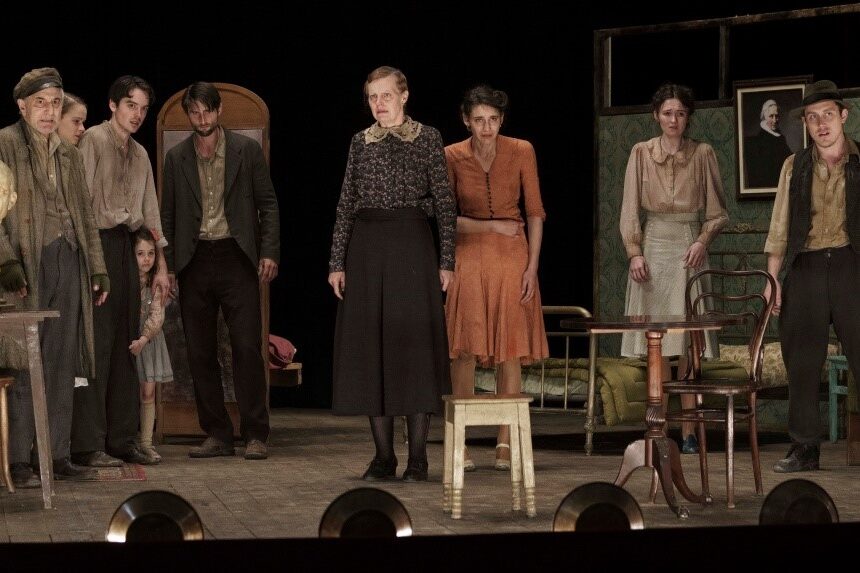Love Gets a Room
⭐️ ⭐️ ⭐️ ⭐️
Run Time: 1 hour 43 minutes
Stars: Clara Rugaard, Ferdia Walsh-Peelo, Mark Ryder
Writers: Rodrigo Cortés, David Safier, Jerzy Jurandot (excerpts from his 1942 play)
Director: Rodrigo Cortés
In Theaters and Streaming on Pay Per View
It is the Warsaw ghetto, 1942. Cut off from the city, Jews are dying on the sidewalks from starvation, cold and, with increasing frequency, summary execution.
But down one shadowed ghetto street, from deep within a dilapidated theater, comes music. And laughter. And applause.
There is a play going on. And not just a play: In this anteroom to Hell, the entertainment of choice is a feather-light musical comedy.
Such is the dichotomous world that unfolds in Love Gets a Room, a heartfelt wartime drama from Spanish director Rodrigo Cortés, Of course, despite the play-within-the-movie’s silly plot about two young couples who are forced to share a tiny Warsaw flat, desperation shadows both the cast and their audience. What’s more, during this performance, a life-or-death drama is unfolding backstage: The play’s ingénue, Stefcia (a soulful Clara Rugaard) must decide before the final curtain if she is going to attempt an escape from the ghetto that very night with her young daughter.
The opportunity for freedom has come from Stefcia’s ex-boyfriend, Patryk (Mark Ryder), who has scraped together enough cash to pay a smuggler. There is, though, one catch: If she goes with Patryk , Stefcia would have to abandon her current love, Edmund (Sing Street’s Ferdia Walsh-Peelo), leaving him to face almost-certain death all alone.
Obviously, these three should talk this situation over, and they do — during the fleeting moments they are off-stage.
Cortés is the director who famously trapped Ryan Reynolds inside a coffin-sized box in the harrowing 2010 thriller Buried — a movie that unfolded in real-time as the hero desperately tried to escape before he ran out of oxygen. Likewise, Love Gets a Room is also told in real-time, often with long tracking shots that both reveal the theater’s backstage labyrinth and magnify the characters’ sense of urgency.
And while no one here is trying to escape from a phone booth-sized box, the airless atmosphere of the Warsaw ghetto is equally suffocating.
The conceit of Love Gets a Room is that the drama occurs both off stage and on. The furtive lovers’ exchanges about their grim choices play out in the cold, gray courtyard behind the theater or in a scruffy dressing room — and continue, with a subtext known only to the actors, speaking their lines and singing their songs for an unknowing, but enthralled, audience.
A tightrope act like that is a pretty risky proposition for a filmmaker; one that could end up more insufferable than insightful. But Cortés and his company pull it off with remarkable panache, shifting dramatic gears smoothly, particularly when the deeply troubled actors stand behind a prop door, take a deep breath, and burst onto that stage with all the enthusiasm of a bunch of starstruck high schoolers.
The stakes get stacked even higher when a laughing, cordial — and trigger-happy — German officer (creepily effective Magnus Krepper) commandeers a front-row seat during the second act. From behind the stage flats, the actors peer at him and fret. Is he onto the escape plot? Has the show’s gently subversive comedy angered the authorities? Or is this guy just dropping by to wreak a little terror?
The answer will come soon enough; in the meantime, the intrepid cast doubles its determination to offer their fellow prisoners a few hours of diversion. Despite occasional nervous glances at the man with a rifle in the front row, they can’t help themselves. The magic of the theater compels them…and their enrapt audience, as well.
Cortés proves to be intrigued by this notion of art as escape, even when true escape seems impossible. He sees the artist as therapist, parent, and priest, reassuring us that life remains worth living so long as that stubborn human instinct to create persists.
Love Gets a Room, by the way, was an actual musical that enjoyed — if you can use that term — a four-month run in the Warsaw ghetto, until the death camp roundups began. It was written by a Jewish playwright/composer named Jerzy Jurandot, who escaped the ghetto before the exportations. The script and lyrics for the show were preserved after Jurandot’s death in 1979, but the music was not. And so, while the film’s actors recreate Jurandot’s witty words on stage, it has fallen to Emmy-winning composer Victor Reyes to add a song score, which draws deeply from the foxtrot, swing, and romantic tunes that were popular in Poland before the world ended.
Engaging as the film’s young starring cast is, I wish Cortés and his co-screenwriter, David Safier, had found a way to work in Jurandot as a character. It’s as if the play these people are performing wrote itself; for all we can tell there was no living, breathing force behind the ironic jokes and fanciful lyrics that carry so much weight in the film’s narrative. I kept wanting to meet the creator of the play, and Love Gets a Room inexplicably denies us that opportunity.
It’s not a minor omission. Still, Love Gets a Room — as somber a love story as you will ever see — ultimately offers an affirming testament to the stubborn persistence of creativity in the face of craven power.
The monsters will always find ways and reasons to extinguish the light that burns their eyes, but they’ll always be blind to the genius of human resiliency, biding its time, an unquenchable glow down beneath the ashes.
Become a Saturday Evening Post member and enjoy unlimited access. Subscribe now



